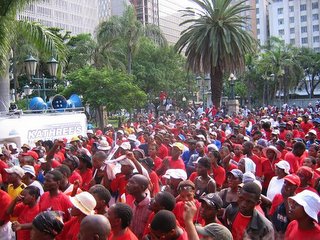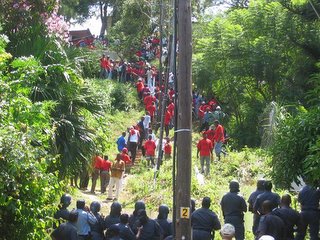Abahlali March on Mayor Obed Mlaba, Sept 28
 15 people were arrested and released during massive police repression of an authorized march to hand demands to Durban Mayor Obed Mlaba by Abahlali baseMjondolo.
15 people were arrested and released during massive police repression of an authorized march to hand demands to Durban Mayor Obed Mlaba by Abahlali baseMjondolo. More information on the march here
photos by Richard Pithouse
A Memorandum of Demands to Mayor Obed Mlaba
Submitted by Abahlali baseMjondolo and Allied Organisations on Friday, 28 September 2007
We the shack dwellers of Durban & Pinetown and our comrades from around the province are democrats and loyal citizens of the Republic of South Africa. We stand here because we are being evicted from our homes and forced off the farms and out of the cities. We stand here because we are dying in shack fires because we do not have electricity. We stand here because we are being raped when we try to find a safe place to go to the toilet in the night. We stand here because we are denied the right to visit the graves of our ancestors. We stand here because in many settlements thousands of people share each tap and toilet. We stand here because children are being forced to stay in their parent's shacks long after they are grown and have their own children. We stand here because we fear that 2010 will be our doom. We stand here because your Municipality breaks the law every time it demolishes our shacks and evicts us without a court order. We stand here because it is clear to us that the rich do not want to give us any space in the cities, in the rural areas or any where in the country and that the politicians have decided to be the partners of the rich. We stand here because our councillors do not represent us and so we have to represent ourselves.
The same economy that made the rich to be rich has made the poor to be poor. The wealth in this country was built on the theft of our land and from our work in the farms, mines, factories, kitchens and laundries of the rich. We can not and will not continue to suffer the way that we do. We can not and will not allow our voices to be stifled. The time has come for the poor to be heard. The time for politicians to talk for and about the poor while they make deals with the rich is over. The time has come for politicians to talk to the poor and to talk to the poor openly and honestly and respectfully so that we can, together, ensure that there is a place for everyone in this city and in this country.
 Mayor Mlaba, today we the shack dwellers of eThekwini make the following demands to you:
Mayor Mlaba, today we the shack dwellers of eThekwini make the following demands to you:· We demand participation in genuinely democratic processes of consultation and citizenship.
· We demand an immediate moratorium on the evictions and demolitions that result in some people being left homeless and others being forcibly removed out of the city.
· We demand adequate land and housing in the city so that we can live in safety, health and dignity.
· We demand an immediate moratorium on the selling of government owned land to private developers
· We demand a commitment to the expropriation of privately owned land for collective, social housing
· We demand an immediate commitment to seriously explore the possibility of upgrading rather than relocating each settlement and to undertake this exploration in partnership with each settlement
· We demand an immediate moratorium on the eviction and harassment of street traders
 · We demand that electricity be installed in all shack settlements.
· We demand that electricity be installed in all shack settlements.· We demand an adequate supply of well maintained toilets in all settlements.
· We demand an end to the shortage of taps in our settlements.
· We demand refuse removal in all settlements.
· We demand well-resourced and staffed health facilities and support for our own initiatives to care for people living with HIV/AIDS.
· We demand support for our crèches and an end to the exclusion of our children from schools and universities.
 · We are threatened by criminals and we are threatened by police officers who treat us as if we are criminals. We therefore demand policing that respects the poor.
· We are threatened by criminals and we are threatened by police officers who treat us as if we are criminals. We therefore demand policing that respects the poor. · We demand an immediate recognition that all settlements will experience natural growth, especially as children grow up, and that this requires existing shacks to be expanded and new shacks to be built.
· We demand an immediate explanation as to what happened to the R10 billion Phoenix East housing development that you promised us after we marched on you on 14 November 2005.
· We demand an immediate explanation from you as to what happened to the piece of land adjacent to Loon Road promised to the Foreman Road settlement when you visited the settlement while campaigning for the 2000 local government elections.
· We demand an immediate explanation from you as to what happened to the piece of land across from the Kennedy Road settlement which was promised to Kennedy Road by Yakoob Baig while campaigning for the 2000 local government elections.
 · We demand an immediate investigation into the rampant corruption in the drawing up of housing lists.
· We demand an immediate investigation into the rampant corruption in the drawing up of housing lists. · We demand an immediate investigation into the activities of the notorious Pinetown gangster landlord Ricky Govender.
· We demand an immediate investigation into the activities of the notorious police officer Glen Nayager.
We also want to use this platform to, with our comrades who are here today from around the Province, make the following demands to the other Municipalities and to the Provincial Government:
· The Slum Elimination Act is immoral and illegal. Our settlements are communities to be developed not slums to be 'eliminated'. This Act must be scrapped immediately.
· There must be immediate action to prevent farm workers from being evicted, harassed and banned from visiting their ancestor's graves.
· There must be immediate action to prevent the enclosure of land for private game reserves.
· There must be immediate action to prevent the threatened evictions in eNkwalini
· There must be immediate action to prevent the eThekwini & Msunduzi Municipalities as well as private landowners from continuing to carry out illegal demolitions and evictions and forced relocations to rural ghettoes like Park Gate and France.
· Those of us living in municipal flats note that in addition to providing substandard housing, the councils charge rents way in excess of our ability to pay. We therefore demand the writing-off of all rental arrears.
 · We opposed the hosting of the 2010 World Cup on the grounds that we couldn't afford to be building stadiums when millions have no houses. But now that it is coming there must be an immediate commitment to declare that the World Cup will be an '100% Evictions Free World Cup' all across the province. i.e. That there will not be any evictions of shack dwellers or streets traders.
· We opposed the hosting of the 2010 World Cup on the grounds that we couldn't afford to be building stadiums when millions have no houses. But now that it is coming there must be an immediate commitment to declare that the World Cup will be an '100% Evictions Free World Cup' all across the province. i.e. That there will not be any evictions of shack dwellers or streets traders.Today people from around the city and the province are uniting in support of our struggle. Today we express our support for our comrades elsewhere. We stand with our comrades in Joe Slovo in Cape Town and we stand with our comrades in Protea South, Kliptown, Thembelihle, and Thembisa in Johannesburg. We also stand with our comrades in Harare, Istanbul and Port-au-Prince. We assert, in particular, our support for Shamita Naidoo, Louisa Motha and all of the people of Motala Heights who are facing violence, death threats and the constant threat of illegal evictions at the hands of Ricky Govender.
Today, we demand answers. We have approached the municipality on many occasions, and many promises have been made to us. Yet still we have no land. We still have no houses. We are still being pushed out of the cities. We still have no electricity and so we are still terrorized by shack fires. The municipality says it will house us. We demand to know when. We demand to know where. We demand to know how many houses. We demand to know who will be resettled. We demand to receive all of this information in clear language and on a regular basis and to be consulted about these decisions.
We are here to stay. We will not go away. We will not be silent.
more at www.abahlali.org







